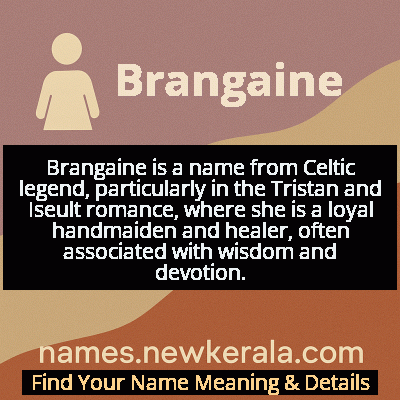Brangaine Name Meaning & Details
Origin, Popularity, Numerology Analysis & Name Meaning of Brangaine
Discover the origin, meaning, and cultural significance of the name BRANGAINE. Delve into its historical roots and explore the lasting impact it has had on communities and traditions.
Name
Brangaine
Gender
Female
Origin
Celtic
Lucky Number
8
Meaning of the Name - Brangaine
Brangaine is a name from Celtic legend, particularly in the Tristan and Iseult romance, where she is a loyal handmaiden and healer, often associated with wisdom and devotion.
Brangaine - Complete Numerology Analysis
Your Numerology Number
Based on Pythagorean Numerology System
Ruling Planet
Saturn
Positive Nature
Ambitious, efficient, realistic, and authoritative.
Negative Traits
Materialistic, stressed, confrontational, and can be overly ambitious.
Lucky Colours
Dark blue, black.
Lucky Days
Saturday.
Lucky Stones
Blue sapphire, amethyst.
Harmony Numbers
2, 4, 6.
Best Suited Professions
Business leaders, managers, financial services, law enforcement.
What People Like About You
Leadership, determination, organizational skills.
Famous People Named Brangaine
Brangaine of Cornwall
Legendary Handmaiden
Trusted companion to Iseult in Tristan and Iseult legends
Brangaine (Literary Character)
Literary Figure
Central supporting character in multiple Tristan and Iseult versions
Brangaine (Operatic Character)
Opera Character
Featured in Richard Wagner's opera 'Tristan und Isolde'
Name Variations & International Equivalents
Click on blue names to explore their detailed meanings. Gray names with will be available soon.
Cultural & Historical Significance
Extended Personality Analysis
Brangaine's personality represents a fascinating blend of medieval virtues and human complexity. Her most defining trait is profound loyalty, which she demonstrates through unwavering support of Iseult despite the personal risks involved. This loyalty isn't blind obedience but rather informed devotion based on deep affection and shared history. She exhibits remarkable emotional intelligence, understanding the nuances of human relationships and anticipating consequences that others miss. Her practical wisdom makes her an effective problem-solver in crises, from the love potion incident to later attempts to conceal the affair. Brangaine shows considerable courage in facing potential discovery and punishment, yet maintains a calm, composed exterior that belies the stress of her position. She embodies the medieval ideal of discretion - knowing when to speak and when to remain silent, when to act and when to observe. Her character development across different versions of the legend shows increasing complexity, from simple servant to moral agent wrestling with conflicting duties. This psychological depth makes her one of the most relatable characters in medieval romance, representing the struggle to maintain integrity while navigating impossible situations where every choice carries moral compromise.
Modern Usage & Popularity
In contemporary times, Brangaine remains an exceptionally rare given name, primarily chosen by parents with specific interests in Arthurian literature, Celtic mythology, or medieval history. Its usage patterns reflect niche appeal rather than mainstream popularity, with most modern bearers coming from families with Celtic cultural connections or academic backgrounds in medieval studies. The name has never appeared on popular baby name charts in English-speaking countries, maintaining its status as an exclusive literary choice. Recent years have seen minimal but steady usage, particularly among parents seeking strong, feminine names with mythological resonance that avoid current naming trends. The name's complexity and unusual sound may deter some parents, while others appreciate its distinctiveness and rich cultural associations. Modern usage often involves practical considerations like nickname potential (Bran, Raina) and spelling explanations. The name's rarity ensures that bearers stand out, while its literary pedigree provides conversation-starting cultural capital. Current naming trends favoring unique mythological and literary names suggest Brangaine may see slightly increased usage, though it's unlikely to become common given its specific cultural references and challenging pronunciation for those unfamiliar with the legend.
Symbolic & Spiritual Meanings
Brangaine's symbolic significance operates on multiple levels, beginning with her name's raven etymology which connects her to Celtic bird symbolism. Ravens in Celtic tradition represent messengers between worlds, guardians of secrets, and bearers of prophetic knowledge - all qualities Brangaine exhibits in her literary role. She symbolizes the medieval concept of 'trouthe' or sworn loyalty tested by circumstance, representing how personal devotion can conflict with social duty. The love potion incident makes her a symbol of unintended consequences and the way momentary errors can reshape entire lives. Her character embodies the tension between light and shadow - she operates in the background yet illuminates crucial truths, maintains secrets yet reveals essential understandings. Brangaine represents the often-overlooked power of secondary characters whose actions drive primary narratives. She symbolizes female wisdom and practical intelligence in a world dominated by male authority, showing how influence can be exercised through insight rather than overt power. The metaphorical meaning of her name extends to protection (as she protects Iseult), transformation (as her actions transform relationships), and mediation (as she bridges different social spheres). This rich symbolic layering makes Brangaine's name carry profound metaphorical weight beyond its surface meaning.

